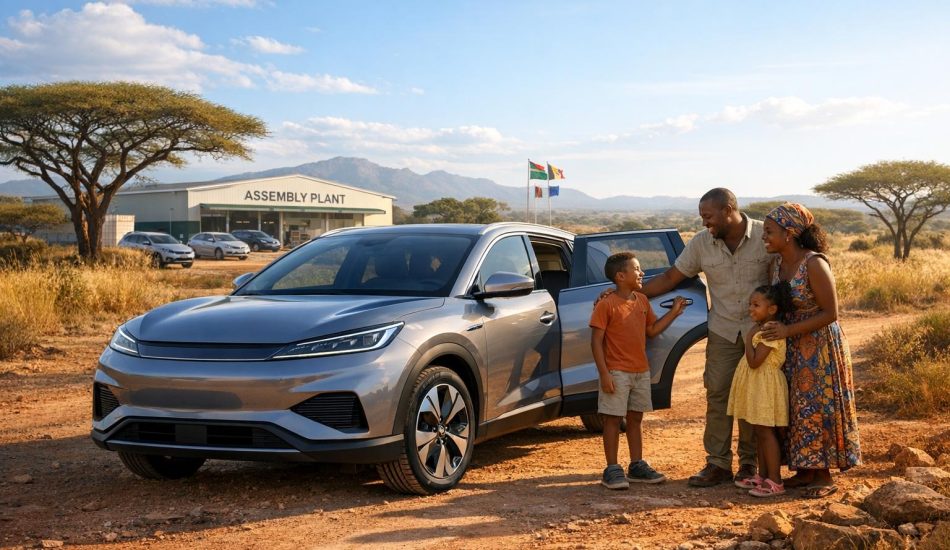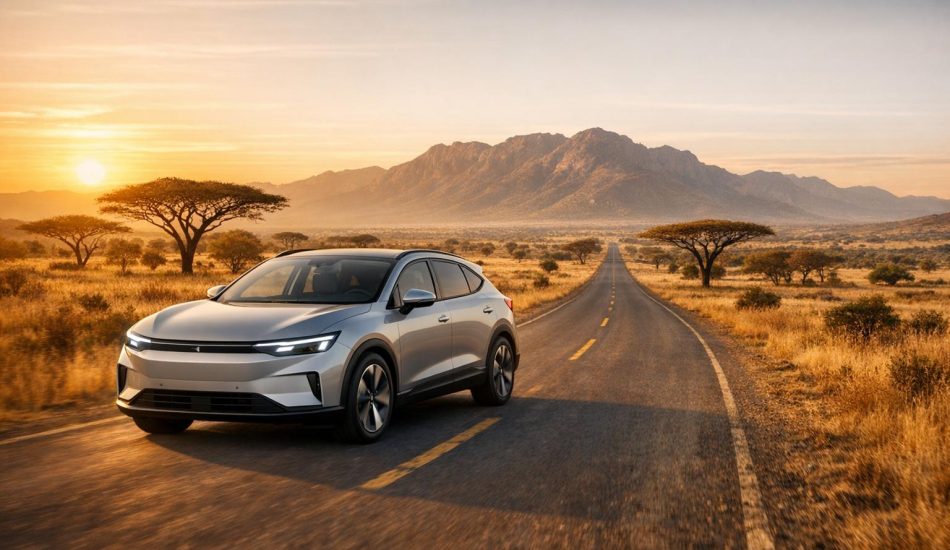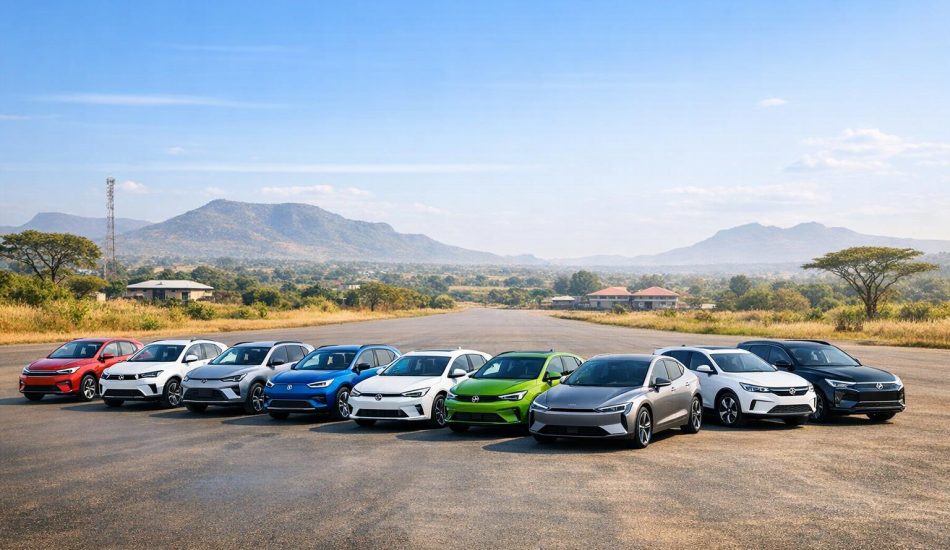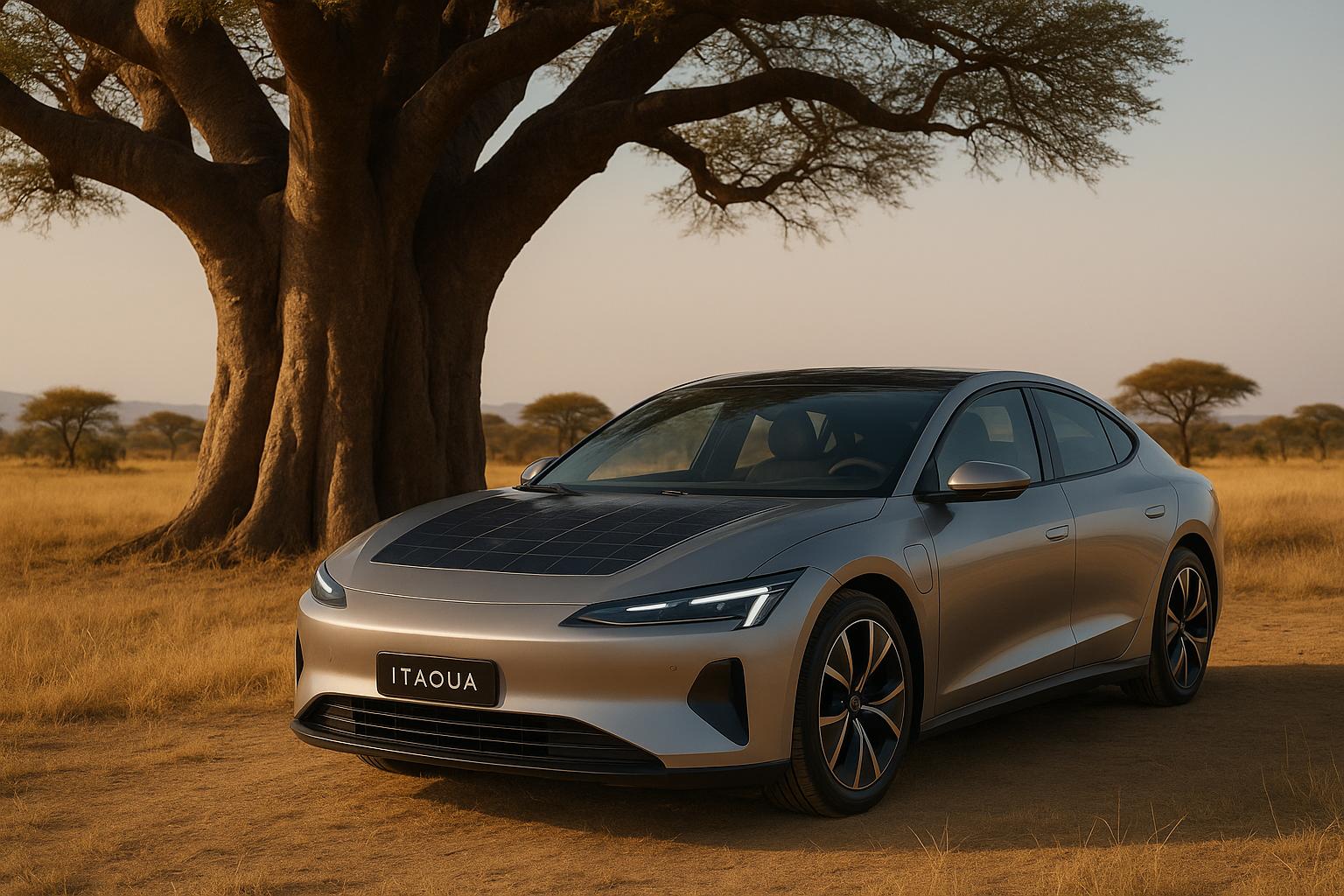
Itaoua is a groundbreaking electric car company based in Burkina Faso, focused on vehicles designed specifically for Africa’s unique road conditions and climate. Established in 2021, Itaoua aims to address local transportation needs while promoting eco-friendly mobility solutions. Its flagship models, the Native and Sahel, are solar-powered and equipped with modern features like GPS and Bluetooth, making them practical for regions with limited infrastructure.
Key highlights:
- Founded: 2021 in Burkina Faso.
- Leadership: Abdoul Kader Bougouma.
- Production Milestone: Launched Burkina Faso’s first locally made electric car in January 2025.
- Vehicle Features: Solar charging, durable components, and energy-efficient systems designed for Africa’s terrain and climate.
- Economic Impact: Creates jobs, strengthens local industries, and reduces reliance on imports.
- Environmental Focus: Solar-powered technology leverages Africa’s abundant sunlight, reducing emissions and reliance on traditional charging infrastructure.
Itaoua is not just building cars; it’s reshaping Africa’s transportation landscape by combining local expertise with sustainable energy solutions. Its approach highlights the potential for innovation within the region while driving economic and technological progress.
Itaoua‘s Background, Mission, and Goals
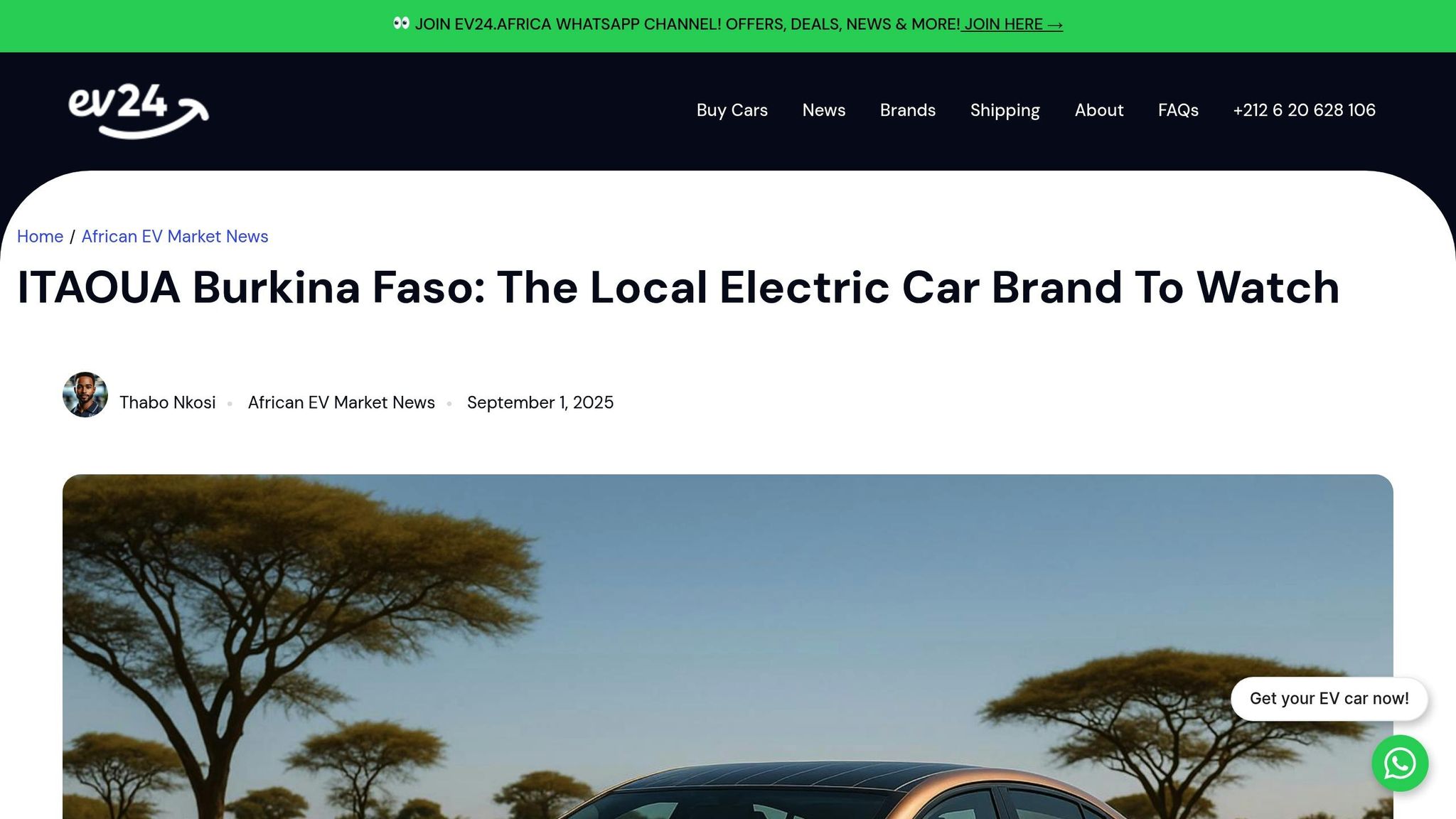
Company Origins and Leadership Team
Founded in 2021, Itaoua emerged as Burkina Faso’s first fully local electric vehicle brand, setting its sights on turning the region into a technology hub. Leading the charge is Abdoul Kader Bougouma, who has been at the helm since the company’s inception in February 2021. Under his leadership, the company has grown into Groupe ITAOUA, which includes Itaoua Services, Automobile, Motors SA, and African Builder Of Future.
The company’s production facility is strategically based in Ouaga 2000, one of Burkina Faso’s most prominent districts. On January 26, 2025, Itaoua made history with the unveiling of the country’s first locally produced electric vehicle – a milestone that garnered international attention and underscored the potential of local innovation.
This achievement forms the foundation of Itaoua’s broader vision, which seeks to drive both environmental progress and economic growth in the region.
Goals for Clean Energy and Economic Development
Itaoua’s mission reaches far beyond just producing electric vehicles. The company is determined to redefine Africa’s approach to transportation technology while addressing pressing economic and environmental issues. Their guiding philosophy is summed up in this statement:
"Innovation is not the preserve of great powers, but that it can also germinate, grow, and radiate from the heart of the Sahel in Africa."
By manufacturing vehicles locally, Itaoua achieves multiple goals: reducing carbon emissions, conserving foreign exchange, and creating high-tech jobs. These efforts not only boost local expertise but also strengthen Burkina Faso’s workforce with advanced technical skills, fueling broader economic development.
This approach has a ripple effect. By proving that African engineers can design and produce sophisticated products like electric vehicles, Itaoua inspires other entrepreneurs and companies to tackle ambitious technological challenges. Such initiatives could reshape manufacturing and technology development across the continent.
Additionally, Itaoua’s focus on utilizing local resources ensures that more value remains within the region. This strengthens supply chains and creates opportunities for other businesses, further enhancing the economic benefits for Burkina Faso and beyond.
Itaoua’s Main Vehicle Models and Specifications
The ‘Native’ and ‘Sahel’ Vehicle Models
Itaoua’s standout models – the Native and the Sahel – are fully electric and solar-powered, making them a forward-thinking choice for sustainable transportation in Africa. These vehicles come equipped with modern features like solar charging, Bluetooth connectivity, and GPS navigation. As Dorothy Tiyah from Africanvibes.com puts it:
"The vehicle’s advanced features, such as solar charging, Bluetooth connectivity, and GPS navigation, demonstrate the country’s commitment to sustainable innovation."
By combining renewable energy with cutting-edge technology, these models are tailored to meet Africa’s transportation demands in an eco-friendly and efficient way.
Technology Features and Vehicle Design
The Native and Sahel models reflect Itaoua’s dedication to crafting vehicles that balance environmental awareness with practicality. These cars are a testament to how African-engineered electric vehicles can hold their own against global competitors while meeting the specific needs of local markets.
How Itaoua Addresses African Market Challenges
Local Manufacturing and Engineering Approach
Itaoua takes a tailored approach to vehicle design, crafting cars specifically for Africa’s unique roads and climates. Instead of reworking models from other markets, Itaoua builds vehicles from the ground up to handle the continent’s demanding terrain, extreme weather, and infrastructure limitations.
The company’s local manufacturing strategy prioritizes durability and energy efficiency. Vehicles are equipped with reinforced components designed to withstand unpaved roads, high temperatures, and significant elevation changes. By producing locally, Itaoua reduces import logistics and costs, sources materials from the region, and strengthens customer support networks.
The engineering team focuses on practical, purpose-driven solutions rather than luxury features. For instance, they’ve developed battery systems designed to perform in high-temperature conditions and charging systems that remain effective despite inconsistent power grids. These design choices not only enhance functionality but also contribute to broader economic and environmental goals.
Economic and Environmental Benefits
Itaoua’s engineering and manufacturing strategies deliver more than just performance; they also bring notable economic and environmental advantages. Local production generates jobs and strengthens regional supplier networks, while reduced imports ensure more financial resources stay within local economies.
On the environmental front, Itaoua’s integration of solar energy technology addresses one of the major hurdles to electric vehicle adoption in Africa. As industry experts have pointed out:
"One of the standout features of the ITAOUA Electric Car is its integration of solar energy technology. With Africa’s abundant sunlight, this innovation extends the vehicle’s range and reduces reliance on charging stations, making it ideal for regions with limited infrastructure."
This solar-powered capability is especially beneficial in rural areas where access to charging stations is scarce. Additionally, by championing a locally developed electric vehicle brand, Itaoua proves that Africa can actively contribute to the global shift toward clean transportation. This approach not only reduces the carbon footprint associated with shipping vehicles internationally but also fosters regional expertise in sustainable transportation technologies.
sbb-itb-99e19e3
Itaoua’s Role in Africa’s Electric Vehicle Future
Shifting Perceptions of African Manufacturing
Itaoua is playing a key role in transforming how automobile manufacturing is viewed in Africa, particularly by focusing on electric vehicles tailored to local needs. This approach emphasizes Africa’s ability to create solutions that go beyond simply relying on imports. By prioritizing local production and tapping into the continent’s resources and expertise, Itaoua is contributing to a broader movement that showcases Africa’s potential for innovation. This change in perspective is also paving the way for strategic collaborations that are helping to expand the market.
Partnerships Driving Market Expansion
As part of this evolving approach to manufacturing, Itaoua is forming crucial partnerships to accelerate growth in the electric vehicle market. Through its collaboration with EV24.africa, the company is working to tackle some of the biggest barriers, such as access to vehicle financing, efficient delivery logistics, and reliable after-sales support. These efforts aim to create a more accessible and supportive infrastructure for electric vehicle adoption.
At the same time, policy shifts across Africa are promoting cleaner transportation and supporting local manufacturing initiatives. By aligning with these policies and strengthening its partnerships, Itaoua is positioning itself to create a sustainable electric mobility ecosystem across the region.
From Desert Dust to Electric Dreams: Itaoua’s Revolutionary Burkina Faso-Made EV
Conclusion: Itaoua’s Impact on African Transportation
Itaoua is making waves in Africa’s transportation sector by focusing on locally crafted solutions, as seen in its Native and Sahel models. These vehicles are designed with the region’s unique challenges in mind, showcasing a thoughtful approach to engineering that meets local needs.
The company is also setting itself apart by emphasizing eco-friendly designs. This commitment not only aligns with global environmental goals but also addresses the region’s growing need for sustainable development. By prioritizing local manufacturing, Itaoua creates jobs, boosts technical skills, and keeps more revenue circulating within African economies. At the same time, these efforts attract investments and lay the groundwork for future advancements in technology and industry.
Itaoua’s work goes beyond just vehicles. Its focus on electric designs that meet global standards while adapting to local conditions demonstrates the continent’s potential for ingenuity. This approach is drawing attention from investors and encouraging technology transfer and collaborative efforts across the sector.
Adding to this, Itaoua’s partnerships – such as its collaboration with EV24.africa – play a crucial role in streamlining financing, logistics, and after-sales services. These partnerships are helping to accelerate the development of Africa’s electric mobility ecosystem.
As the electric vehicle market in Africa continues to grow, Itaoua’s influence could serve as a model for others, setting new standards for sustainable growth. Through its innovative strategies and focus on empowering local communities, the brand is shaping the future of transportation across the continent.
FAQs
How does Itaoua’s solar technology help areas in Africa with limited charging options?
Itaoua’s solar-powered technology brings a smart and practical option to areas in Africa where charging infrastructure is scarce. By using solar energy, these vehicles can recharge independently of the electrical grid, which is often unreliable or nonexistent in remote locations.
This method supports self-sufficiency in energy use while offering a budget-friendly and eco-friendly way to charge. It allows drivers in underserved regions to keep moving without depending on conventional charging stations, making electric vehicles a more realistic and useful choice across the continent.
What sets Itaoua’s ‘Native’ and ‘Sahel’ models apart, and how do they address Africa’s unique transportation challenges?
Itaoua has developed two electric vehicles, the ‘Native’ and the ‘Sahel’, to cater to the unique transportation demands across Africa. The ‘Native’ is crafted for urban commuters, featuring GPS navigation, Bluetooth connectivity, and solar charging – perfect for city life. Meanwhile, the ‘Sahel’ is built for tougher, rural terrains, boasting enhanced durability and off-road capabilities to handle more demanding conditions.
Both vehicles combine advanced technology with region-specific functionality, offering practical options for Africa’s shift toward sustainable transportation. Whether you’re navigating bustling city streets or venturing into remote areas, Itaoua’s designs aim to meet the needs of drivers across the continent.
How does Itaoua support economic growth in Burkina Faso and across Africa through its local manufacturing efforts?
Itaoua is making strides in Burkina Faso and across Africa by producing electric vehicles locally. This initiative isn’t just about transportation – it’s creating thousands of jobs in areas like manufacturing, sales, maintenance, and renewable energy. These opportunities are helping to grow the workforce while fostering skill development in key industries.
By prioritizing local production, Itaoua is bolstering supply chains, developing technical expertise, and encouraging economic independence. These efforts don’t just strengthen Burkina Faso’s economy – they also support progress across Africa, paving the way for a cleaner and more forward-thinking future.


